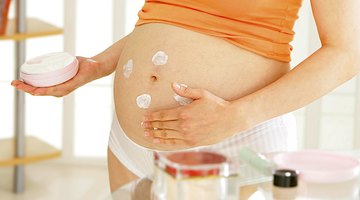Hair Breakage During Pregnancy
Many physical and psychological changes accompany pregnancy. Weight gain, fatigue, morning sickness and hormonal fluctuations are all common symptoms of pregnancy.
Changes in the texture, length and speed of growth of hair are experienced differently by pregnant women. Hair breakage during pregnancy might be unavoidable for some, but precautions and treatment can help prevent further damage.
Hair Breakage
Hair breakage occurs when pieces of a strand of a hair break off from the original thread of hair.
The whole piece of hair does not fall out, just a section of the bottom breaks away. Hair breakage can be noticeable, cause changes in hair length and affect a person's self-esteem.
Causes During Pregnancy

Oily Hair During Pregnancy
Learn More
During pregnancy, hormone levels increase in the body. The increase in hormone levels can have different effects on hair growth and health for women.
During pregnancy, the hormonal changes prevent regular shedding of hair.
As a result, many women experience thicker and longer hair during their pregnancy. Some women report dryness, split ends and breakage.
Pregnancy may contribute to breakage because it prevents hairs that would have normally shed themselves from falling out. The hair may be long, but if it is damaged, it will lead to breakage.
Self Treatment
Women who experience hair breakage during pregnancy should brush their hair gently, avoid pulling their hair back tightly and should deep condition their hair on a weekly basis.
High heat can lead to breakage, and allowing hair to dry naturally or using a low heat setting on the hair dryer can prevent further breakage. Coconut oil can be applied to hair tips and used as a softener. A prenatal vitamin may improve hair health and might contribute to healthy hair growth during pregnancy.
Treatment

Is Hair Glaze Safe During Pregnancy?
Learn More
Treat existing hair breakage at home or at a salon. Hot oil treatments and deep conditioning can help repair damage done to hair. Avoid over-processing or coloring hair--it will cause additional breakage. Aloe Vera and avocados (mashed and mixed with an egg and half of teaspoon of olive oil) can provide respite for hair breakage and help restore hair to a healthy condition. During pregnancy, women should get their hair cut every four to six weeks. Regular trims rid the head of unhealthy hair and prevent future hair breakage.
Post-Pregnancy Hair Care
Pregnancy hormones diminish and a woman's body returns to its normal hormonal state about four months after giving birth.
Regular shedding will resume itself, and most women experience hair growth and health similar to before their pregnancy. Incorporating the same treatments that were used during pregnancy will help prevent unwanted hair breakage.










